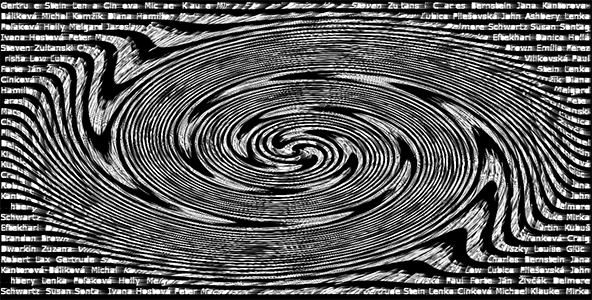Small cultures import disproportionately more texts—both translated and original—than they export. However, literatures using a language with a limited number of speakers are not just markets for globalised goods. Translations quite naturally also help them develop and sometimes even exist, as cases of small languages that ceased to be the target languages for translations show. Revue svetovej literatúry (Review of world literature) is a Slovak magazine founded in the “golden” 1960s that brought an abundance of new impulses to Slovak literature from all over the world for the past fifty years. Late last year, writer and translator (and Asymptote past contributor) Peter Macsovszky and literature and translation scholar Ivana Hostová edited and co-translated (with the help of a team of translators) an issue of the magazine with a focus on contemporary and twentieth-century Anglophone literature from the US.
In her Buying into English (2008), Catherine Prendergast analyses the semantics and economics linked to the ability of speakers of a minor language—in this case Slovak—to use the language of global communication. She compares the perceived value of English in Slovakia immediately after the fall of state socialism and then in almost two decades in the post-communist Slovakia. The strict restriction of the flow of information between socialist Czechoslovakia and the Western world gave rise to an idealised notion of the Anglophone (and, more specifically, American and capitalist) world. It came to signify freedom and prosperity and was—in the minds of many Slovaks—expected to embrace and accept with curiosity and eagerness the cultures and peoples freed from the socialist regime. Prendergast suggests that the notion was only abandoned after it slowly became clear that “the lingua franca is language-as-battlefield; it is the terrain upon which players in the global information economy grapple for property, respectability, and political voice.” Now it has become obvious that it takes more than pureness of heart and an admiration for the American culture and way of life to extract any interest from what Michael Cronin in his Eco-Translation (2017) has called the crowded Anglophone attentionscape.
The proportion of imported versus exported goods including cultural products can be very well illustrated by the amount of translations produced in the Anglophone countries as opposed to cultural spaces[i] like Slovakia. Therefore, wanting to import even more texts from the dominant to small culture might seem like carrying coals to Newcastle. However, if we try to differentiate between a piece of writing as a commodity that primarily generates economic profit and institutional legitimation and look at the autonomous sections of the literary field—at those works that were not created to make the author famous or rich, but which came into being in order to exist for themselves and in their own right—it may come as a surprise that not much American writing can really be found in Slovak translation. In this context, an issue of a Slovak literary magazine bringing translations of Anglophone writing from the United States seems redundant only at first glance. Most of the literature written in the US that gets translated into Slovak nowadays can best be described as a commodity—currently, the best-selling book in the biggest Slovak bookshops is the translation of Dan Brown’s Origin (2017)—it is the kind of writing that, although undeniably culturally domineering and shaping the receiving context, does not inspire in the sense of creating resistance to the existing (cultural) preconceptions or fluent strategies of reading.


